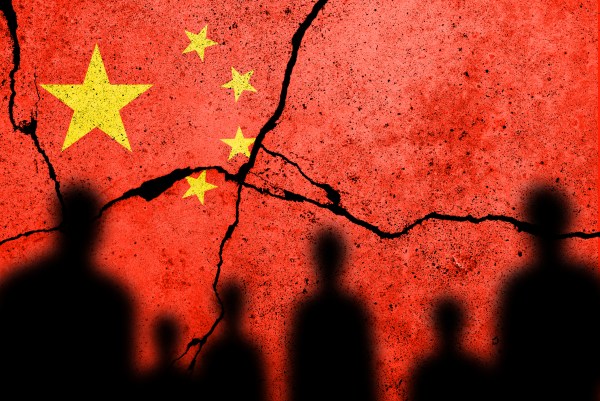Do you ever wonder how much fatigue is part of the agenda?
If you are in my business, you’re used to hearing the same nonsense talking points day after day from the same people, and you learn to more or less ignore it. It’s part of the job, part of what we get paid to do. But for people who have other kinds of jobs and other kinds of lives, one wonders how many times are they going to respond to nonsense such as, “The economy does better under Democratic presidents!” or “Putin didn’t invade Ukraine when Trump was in office!” and things of that nature. The arguments are silly and meretricious, and the people making the arguments often know they are silly and meretricious. Sometimes, you have to respond to them—sometimes I do, because it is my job—but, sometimes it is a waste of time.
I am not putting myself next to Aleksandr Solzhenitsyn here (you know, in case you were wondering) but I often think of something my friend Jay Nordlinger says about him: He almost never responded to critics, not as a moral matter but as a matter of time. Nordlinger quotes the great author’s son, Ignat Solzhenitsyn: “He could have written The Red Wheel or he could have dealt with his critics. He did not have time to do both.” And so, he wrote The Red Wheel.
I respond to less of the most predictable kind of nonsense than I used to, and I mean to respond to even less of it, because I have come to suspect that fatigue really is part of the agenda—just keep repeating the same nonsense until people get tired of answering it and then pretend you’ve won the debate. I don’t think a fatigued writer is a lot of fun to read, usually. But I’ve also changed my mind about how much it matters. The people who read Epoch Times don’t believe that horsepucky any more than the people who write it do—it is a kind of ceremonial discourse, a form of therapy masquerading as journalism.
I was supposed to host a book discussion on C-SPAN this week. And then I read the book: vaccine kookery, stolen-election kookery, January 6-was-an-FBI-caper kookery, etc. Dumb and dishonest stuff, and stuff with which I do not wish to be associated, even in a critical way. I emailed the producer and withdrew. I think it probably was the right decision, though I hate to inconvenience the folks at C-SPAN, who are, I think, trying to do something high-minded and honest, which is difficult to do in an environment that is so full of that which is low-minded and dishonest.
It really has been something terrible to witness a whole generation of conservative writers and activists descend into crackpottery. It was shocking, at first. Now, it is just boring and repetitive. So, I suppose I’ll be spending less time responding to that sort of thing. I’m not going to call it a resolution, but maybe a goal.
In any case, the meaty part of this week’s newsletter is in the next section.
Economics for English Majors
You know BABA? No? That’s “Build America, Buy America,” the premier representative of the Biden administration’s ill-conceived furtherance of Trump-style economic nationalism, which will impose a very large selection of expensive, destructive, and—this part matters!—useless rules on a host of American industries.
The final BABA “guidance” goes into effect today.
Joe Biden, a lifelong adherent of the superstition of the clockwork universe, would like to see more manufacturing of certain kinds happen in the United States rather than in other countries. Why? Because it would be better if fewer Americans spent their days designing iPhones and doing weird math for quant funds and more time shoveling carbon black in tire factories? No, not really. If Americans really wanted to do dirty industrial jobs, there probably wouldn’t be so many Somalis living around Amarillo, Texas—native (you know what I mean) Americans would be staffing those meatpacking plants.
Biden, like Donald Trump and many similar men of their generation—and like a lot of men and women of younger generations who ought to know better—suffer from post-war nostalgia, the rosy-hued (and completely false) belief that between the end of World War II and the early 1970s, there existed in these United States a kind of blue-collar utopia in which anybody (any man—that’s going to matter) who wanted to work could trundle off down to the local widget factory and sign up for a job on the widget line. That widget-building, in these folks’ memories, was hard but honest work; it didn’t make men rich, but it made them and their families economically and socially secure, with enough income and enough stability to live with dignity.
This idea isn’t just an economic fantasy—it is part of a broader cultural invention rooted in the belief that what led to the divorce epidemic and end of stable nuclear families in the 1970s was bad economic policy rather than bad choices made by millions and millions of Americans who decided they were tired of their families and that they were willing to risk solitude and alienation—and to partially or entirely abandon their children—in the pursuit of greater sexual variety. That is one of the great vector-of-causation reversals of our time: the belief among unhappy American men that they cannot be the sort of men that their fathers or grandfathers were because they can’t earn a living, when in fact they find it difficult to build stable lives—including family lives and work lives—because they are not the sort of men they should be.
The libertarian writer Brink Lindsey famously observed that “Republicans want to go home to the United States of the 1950s, while Democrats want to work there,” but neither part of that is exactly true. You can have a median 1950s standard of living in 2023 on a very, very modest income: In 1950, 1 in 5 U.S. homes lacked what is euphemistically known as “complete plumbing” (meaning running water and a toilet) and about the same share of households relied either on coal or wood for their primary heating fuel. The share was a lot higher in many parts of the country: Two-thirds of Alabama households lacked plumbing in 1950, as did half of those in Iowa, more than a third in Arizona and Florida, and almost 75 percent in Mississippi. If you really want a 1950s standard of material life, poverty is ready when you are. It always is.
But Americans don’t really want the moral or social life of the 1950s, either, whatever they say. There isn’t any serious effort to resurrect, say, the old model of marital laws before “no-fault” divorce or to bring back widespread lawsuits for adultery, and, if there were, you can bet that most Republicans would oppose such efforts—especially the ones who are the loudest about their commitments to the traditional family, e.g., recent divorcées such as Lauren Boebert and Marjorie Taylor Greene. There is a reason these people flock to Donald Trump, who entered his true calling—being a celebrity—making a tabloid spectacle of himself publicly and cruelly mistreating his wives and children. Joe Biden, who has never lifted anything heavier than money and whose family life is not exactly of the Father Knows Best variety, is far from an advertisement for the hard-work-and-clean-living ethos associated—again, wrongly—with the postwar years. Sure, there was a lot of Leave It to Beaver in the 1950s—but there was a fair bit of Last Exit to Brooklyn, too. The main cultural product of the 1950s was, after all, the delusional, narcissistic cohort that gave us the 1960s.
Neither of these nostalgists wants that 1950s blue-collar life for his children, of course: Hunter Biden didn’t punch a clock to earn his bread—he went to Yale and then went into the family business of grifting. When Eric Trump comes into contact with a working-class person, that person is a waiter at Crêperie du Village. (Try the fondue—sure, it’s $80, but it’s pretty good.) The problem, from the rarefied point of view of these champagne working men, is … you, peon, you and your kids and people like you. You people, who, let’s face it, aren’t going to go to Yale Law School, are bound to get into trouble of one kind or another—a life of crime, and not a really high-end life of crime like Hunter Biden’s!—unless something can be done about you, and what can be done about you is a job. You, prole, need to go work in a tire factory, and, if there aren’t any tire factories, then we’re going to magic some tire factories into existence by passing a law that says companies working on federal projects have to “Buy America, Build America.”
Never mind that we’ve had these dumb laws for more than a century and that they have not led to a resurgence in manufacturing jobs as a share of the overall workforce. Which isn’t a surprise: American manufacturing is sophisticated, relying more on capital and knowledge than on old-fashioned muscle-power. American manufacturing, far from being in a state of crisis, has been thriving in all these years of supposed “deindustrialization” and getting our blue-collar lunch-bucket lunches eaten by the ChiComms. U.S. manufacturing output today is four times what it was in 1960, and more than twice what it was in 1980. U.S. companies make more stuff—and more profitable stuff—than they did in the post-war golden age, and more than they did in the money-tsunami that was the 1990s. And they have grown much more efficient in their manufacturing, which is why they employ fewer people. Of course, we could use various political cudgels to force them to employ more people, although that would almost certainly mean lower wages for everybody, along with less production and less overall economic output. We could take away the earthmoving machinery and make workers use spoons. But we would all be poorer.
A job is a very fine thing. It isn’t the solution to life’s every problem, but it is a pretty good solution to a whole lot of them, like the problem of not having any money and needing to pay the mortgage, or the problem of that nice girl not considering you husband material because you are a shiftless scrub. And it is not as though the decline in manufacturing’s relative share of the workforce has resulted in fewer jobs—indeed, because human effort is inherently valuable, the opposite has been the case, and we have seen disproportionate job growth elsewhere, including in the much-sneered-at “service sector.” For those of you who aren’t among those of us (we few, we happy few, we band of brothers) who spend a lot of time with this stuff, “service jobs” doesn’t just mean people who work at Burger King (not a bad place to work, was my experience) or who clean hotel rooms; the category also includes Wall Street guys, lawyers, and (angels and ministers of grace, defend us!) journalists—as well as lots of other comfortable, well-paid jobs that do not produce tangible goods.
In fact, services work produces almost 80 percent of gross domestic product, which should not be any great surprise: Among the largest and most profitable U.S. companies, manufacturing is a relatively modest part of the portfolio, even for companies that are engaged in manufacturing. There are exceptions, of course, like oil companies. Apple is the world’s largest manufacturing firm measured by revenue—and it gets more than half of its revenue from iPhone sales—but much of its work is in services, too: design, engineering, programming, etc. And, really, those are the jobs you want—would you rather be designing products in California or working on the Foxconn assembly line in Shenzhen?
There are reasons different products get made in different places, and, in spite of all that “race-to-the-bottom” stuff—stuff that turns out to be nonsense!—lower wages and looser environmental and safety regulations are not the all-important drivers. If low wages and light regulation were all that mattered, they wouldn’t build Mercedes sedans in Germany. Sometimes, the big factor is the workforce: Sure, you could build a semiconductor factory in rural Appalachia, but you’d have to import almost all the workers. Sometimes, the big factor is proximity to markets or to transportation hubs or to raw materials. Very often, the big factor is proximity to other adjacent businesses and industries, which is the main reason the U.S. automotive industry grew up around Detroit (where there were workers and firms with useful expertise and experience in marine transportation) rather than thriving in Ohio or New England, even though a great many automobile firms were founded in those other places.
And those adjacent industries often end up being very important, because innovation often happens across firms and sectors rather than within them. There is a reason the most important innovator in the U.S. automobile business right now—Elon Musk—did not come out of Ford or General Motors. “Buy American” programs like the Jones Act—which imposes upon U.S. domestic maritime trade approximately the same rules Oliver Cromwell imposed on the British in 1651—seek to create jobs not by means of enhanced productivity but simply by brute-forcing them into existence by means of legislation, which generally doesn’t work. As I noted in an earlier newsletter, you can’t get liquified natural gas (LNG) from U.S. producers in the Gulf to U.S. consumers in the Northeast because the Jones Act prohibits foreign-flagged vessels from servicing that trade. At the same time, the protection of the Jones Act has stifled competition—and thus innovation—in the U.S. domestic shipping industry, resulting in no U.S.-flagged ships available to do the work that foreign-flagged ships are prohibited from doing. So New England consumers end up importing LNG from the Caribbean or, in some instances, from Russia. U.S. producers effectively get cut out of part of the U.S. market because we are protecting imaginary jobs on nonexistent vessels.
Biden’s BABA is more of the same. And the more detailed a view you take of it, the more ludicrous it looks. The U.S. IT industry is about to take it in the shorts from BABA rules, as the Information Technology Institute, a trade group, notes in a recent letter:
Unfortunately, the guidance fails to account for the realities of the commercial IT industry, which makes products that are essential for delivering broadband access to unserved and underserved communities, clean drinking water, and safe and reliable transportation. By failing to consider and implement industry feedback, the administration has jeopardized the success of its own ambitious infrastructure goals and, more importantly, missed an opportunity to deliver critical services for the American people.
Today’s most innovative technologies are largely developed and produced using established and secure global supply chains. While the tech industry is making investments to expand manufacturing capabilities in the United States, many components like sensors, computers, and semiconductors—which are needed for the boldest infrastructure projects—are either not made in the United States or not yet made in the quantities necessary. Despite this reality, the U.S. government has continued moving forward with restrictive domestic sourcing policies and requirements as the default.
Because this is the federal government we are talking about, waiving BABA rules is not a simple thing. For example, if a contractor is successful in getting a waiver for x component because it is not available from a domestic producer, that waiver holds only for that contractor and that job. If the next contractor on the next job also has an x component problem, that firm has to start the waiver process from scratch, as though the issue hadn’t already been decided on a different project. ITI wants “universal” one-and-done waivers as the standard, which is probably a good idea, but even the most streamlined version of these rules is going to impose billions of dollars in compliance costs on U.S. firms (and invite all sorts of regulation-exploiting shenanigans, too) in order to protect jobs in U.S. computer factories putting out U.S.-built computers made of U.S.-sourced components, which don’t—and this part matters!—exist. As PC Magazine put it: “It’s impossible to buy a PC made entirely of American parts,” although “there are several PC makers that assemble their computers in the U.S.” from components produced by that big ol’ global supply chain that is behind basically every useful thing you touch, including the stuff that is grown on farms in Nebraska.
These are government contracts we are talking about, and there is a time for non-economic policymaking—on non-economic issues. If you want to say, “We have a pretty good national-security case against allowing a Chinese state-owned firm to manufacture the guidance systems in our nuclear missiles,” you aren’t going to get an argument from me. But that is a national-security program, not a jobs program. And as with Sen. Marco Rubio and his endlessly hilarious argument that sugar subsidies are a national-security issue, it is easy to find a pretext for every political favor a politician wants to hand out. If you want to encourage the growth of, say, semiconductor manufacturing in the United States, then BABA-fying infrastructure-contract rules isn’t how you get there. You get there with a better-prepared workforce, better access to materials and markets, a more sensible tax and regulatory environment, etc.
But, that being stipulated, global supply chains are a good thing on their own terms—it is neither necessary nor desirable for the people of the United States to collectively make everything they use and use everything they make. The case for working against the concentration of critical economic activities (the inescapable example is the production of rare-earth minerals) in the police-state economy overseen by Beijing is not a case against trade with Ireland, India, or Botswana. Specialization and the division of labor are what changed the medieval standard of living into the standard of living we enjoy today. Of course there are times when we may want to make exceptions, as there are non-economic issues in the world, and it makes sense to approach those non-economically—or at least not exclusively economically. (There isn’t really anybody of any consequence who believes otherwise, but we may as well consider that straw man preemptively.) The world is complicated.
The Biden administration’s problem is that it thinks this nonsense is an actual economic policy. It isn’t. It is mainly a signaling project and a way to hand out favors (including the favor of economic protection) to politically aligned firms and industries. It will, on net, probably make Americans poorer rather than richer.
And, call me an unevolved Homo economicus, I prefer richer.
Words About Words
Career or careen?
National Review headline: “The Quietly Careening Presidency.”
Biden generally careers—running hither and yon without much in the way of a discernable plan of action or pattern. To career is to follow a course, whether a carefully planned one (“his successful career in medicine”) or a chaotic one (“like a bull careering through a china shop”). A runaway train careers down the track.
To careen is to end up laying on your side, particularly after running into something, or to run into something and kind of bounce off it. The original sense of the word meant to beach a ship in order to expose the part of it usually submerged (the carine) so that it can be cleaned. Careen has a sense of lean or wobble or totter or tilt. You can see Biden kind of tilting, for sure, but I think career is the word here.
In either case, a good read from Jim Geraghty.
Additional Wordiness …
Some years ago, I noted and filed away a press release from a new real-estate agency, one that promised a “revolutionary” approach to selling houses. Revolution, you say? “Yes, we are different from other real-estate agents. We’re revolutionary!” So, you’re not selling houses on commission then? “No, of course, we’re still doing that. But we put our customers first! Revolutionary!” The uncharitable part of me thinks that people who write press releases like that ought to suffer something painful and undignified. There isn’t any revolutionary real-estate agency, thank goodness, and everybody says they “put customers first,” which they do, right up until doing so cuts into profits, and then customers are second, maybe. And that’s okay! Businesses exist to make a profit, and we all know that—no need to B.S. us about it, though.
New York Times: “The Restaurant Revolution Has Begun.”
No, no, it hasn’t.
You know there’s too much romanticism in the world when everybody thinks a revolution is a good thing. Even so-called conservatives promise to go to Washington and launch a revolution.
Hard pass. Keep your revolution.
Elsewhere
You can buy my most recent book, Big White Ghetto, here.
You can buy my other books here.
You can see my New York Post columns here.
Recommended
Modern democratic politics has accepted the principle of the rule of the political majority. But it comes with several caveats. First, it is a rule of the political majority, not of a majority community based on birth. No one can be permanently excluded from the possibility of being part of the political majority. Caste politics has allowed for unlimited permutations and combinations that create a majority—Bahujan or Ahinda or AJGAR or a Dalit-Brahmin-Muslim coalition, to name a few. Religious mobilisation, especially that which leads to a Hindu-Muslim divide, does not leave that possibility and thus creates permanent exclusions.
The second caveat is that majority rule in a democracy cannot be absolute rule; it must respect certain limits. It cannot deprive the minority of basic rights and entitlements, or else they would lose any reason to accept the rule of the majority. That is why our Constitution—like any other democratic constitution—lays down some inviolable rights for religious, linguistic, and caste minorities. The problem with the politics of Hindu majoritarianism is that it seeks to deprive religious minorities of these basic entitlements—freedom of religion, equal treatment before the law, and indeed equal citizenship. This is the tyranny of the majority.
In Closing
The Dispatch has just marked its fourth anniversary. The New York Times and a few other big media outlets have done us a favor this week, by showcasing the kind of distorted, irresponsible, partisan journalism we are trying to avoid here—something about Israel really brings it out in a certain kind of progressive. I am very proud to be a part of this project and am grateful to our subscribers and friends who make it possible.
I have written a great deal about the need for trust (and, hence, for trustworthiness) and transparency in critical institutions, whether those are in the public sector (IRS, FBI, etc.) or in the private sector (the news media, the political parties, etc.). And one thing I keep repeating—and will keep repeating until I think everybody has got it, brain fatigue or no—is that this isn’t some airy-fairy metaphysical concern but an eminently practical one. If the New York Times doesn’t do its job, the alternative isn’t silence—it is irresponsible parties doing the job that the responsible parties have failed to do.
That’s really what happened with the Republican Party. Once it had ceded both its thinking (such as it is) and its communication to talk radio and Fox News, it had stopped doing its job as a political party, and now that work—and the power that goes along with it—is done by people and institutions who are even less responsible than what used to pass for leadership in the Republican Party was. People and institutions are going to continue offering commentary and making claims of fact about Israel, Ukraine, and everything else in the world—but which do you trust? Which can you trust? That isn’t always obvious. But we—and I—are trying to eke out and defend a little corner of the public square where you can trust what you read here. That may sound like an awfully modest project, but it is a heavy lift.
And, so, we lift together.
Correction, October 23: This newsletter originally and incorrectly described the state of current laws around marriage and divorce.









Please note that we at The Dispatch hold ourselves, our work, and our commenters to a higher standard than other places on the internet. We welcome comments that foster genuine debate or discussion—including comments critical of us or our work—but responses that include ad hominem attacks on fellow Dispatch members or are intended to stoke fear and anger may be moderated.
You are currently using a limited time guest pass and do not have access to commenting. Consider subscribing to join the conversation.
With your membership, you only have the ability to comment on The Morning Dispatch articles. Consider upgrading to join the conversation everywhere.